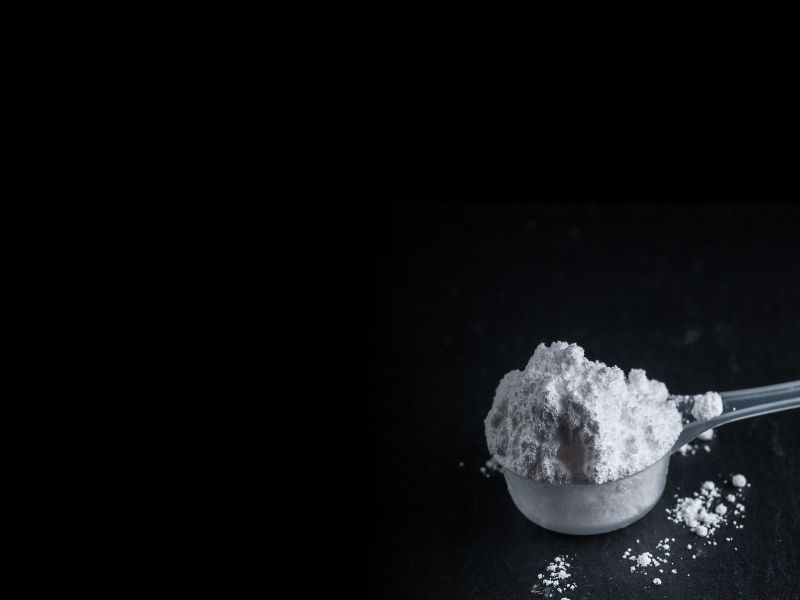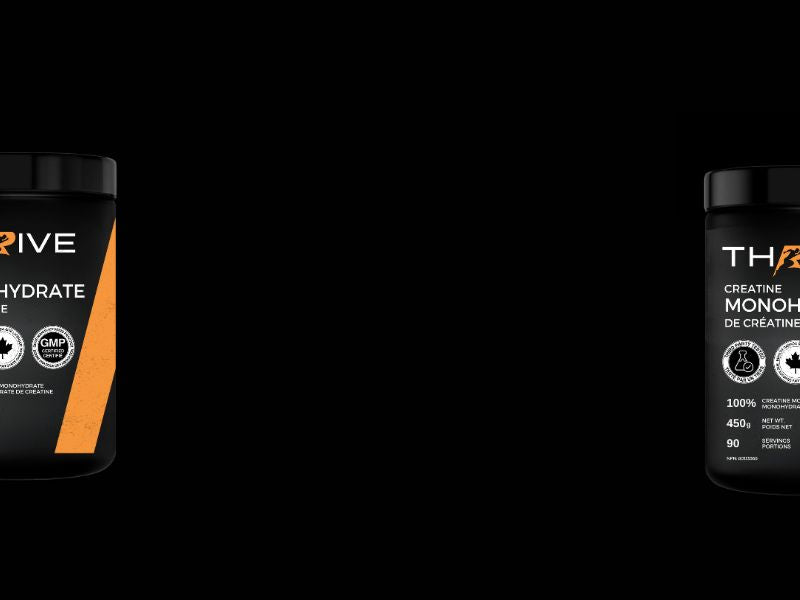

The Science of Creatine - A Complete Guide
How creatine works, its physical and cognitive benefits, and the best type of creatine
Author: Joe Clark
Last Updated: August 24, 2025
Author Note
I have had a long standing interest in the effects of creatine and creatine supplementation. I wrote my university dissertation on the effects of creatine monohydrate supplementation on cognitive performance and have worked on numerous projects examining its effects on athletic performance. This guide includes much of what I have learned during this time, and I hope you find it both helpful and informative.


How Creatine Works
The basics of how creatine works in the human body
Energy Production
The human body requires energy to power all processes in the body, from basic functions such as breathing and digestion, to muscular contractions which allow us to move and carry out athletic endeavours. The energy within the human body is carried within a molecule called ATP, which stands for adenosine triphosphate. ATP is often described as the bodies' 'energy currency' in that it is how energy is transferred within the human body. When ATP is broken down, energy is released, but once it is broken down it needs to be re-synthesised to allow a continual source of energy. The body can re-synthesise ATP in various ways through the complex breakdown of the foods we consume. However, these processes take time, and sometimes the body requires immediate energy. For example, if you lift a heavy dumbbell, or break into a sprint - this requires immediate ATP resynthesis at a faster rate than the breakdown of glucose, fat, or protein will allow. This is where creatine comes in. Human tissues, including muscle tissue and brain tissue store the molecule creatine phosphate as an energy resevoir for when ATP resynthesis is required. Creatine phosphate helps resynthesise ATP providing a source of immediate energy.
Why creatine supplementation works
This is where creatine supplementation comes in. Research consistently shows that having a greater amount of creatine phosphate available within muscle and brain tissue increases the amount of ATP that can be produced (1). Research also consistently shows that creatine supplementation significantly increases the phosphocreatine stores far beyond what is achievable through diet alone. For context, if you tried to consume 5g of creatine (standard daily supplemental dose), it would require eating over a kilogram of red meat (2).


The Physical Performance Benefits of Creatine
How creatine supplementation affects athletic performance
Physical Performance Benefits
Creatine monohydrate is the most heavily researched supplement in sport science, and one of the most efficacious supplements available for improving numerous areas of physical performance.
Strength
One of the most frequently cited benefits of creatine is its ability to increase muscular strength. A meta-analysis of 22 studies found that creatine supplementation, when combined with resistance training, led to strength gains that were 8% greater than those from resistance training with a placebo. In other words, creatine improved the maximum force muscles could produce — as measured by 1RM, 3RM, or 10RM tests. For a supplement, this is a substantial difference and is due to how creatine significantly enhances muscular energy production during the first 8–12 seconds of high-intensity effort, such as lifting heavy weights.
Weightlifting Performance
The same meta-analysis also assessed weightlifting performance, defined as the number of repetitions completed at a given percentage of maximal strength. Creatine supplementation improved performance by 14% on average compared to placebo. Again, this is significant and reflects creatine’s ability to support bouts of high-intensity work — allowing for more total reps and volume in training sessions.
Muscle Growth
A 2022 meta-analysis of 35 studies examining the effects of creatine supplementation on muscle growth following resistance training concluded that, on average, creatine increased muscle mass gains by 1.1 kg more than placebo. The analysis also found that creatine does not significantly increase muscle mass unless used alongside resistance training. Given that most included studies were short term (under one year in duration), this represents a meaningful increase in muscle mass. Another meta-analysis focused on older adults found that creatine supplementation led to an average additional muscle mass gain of 1.4 kg, with study durations ranging from 7 to 52 weeks. Therefore, while an exact percentage increase in muscle mass from creatine supplementation is not currently established, individuals can expect approximately 1.1–1.4 kg of additional muscle mass within a year when compared to placebo. However, there is large individual varation in creatine response, some people will see more and others less.
How Creatine Increases Muscle Growth
Because creatine improves resistance training performance, it can indirectly enhance muscle growth by allowing more total reps, sets, or weight to be completed — all of which contribute to muscle hypertrophy. However, creatine may also promote muscle growth through direct mechanisms, such as influencing muscle cell hydration and intracellular signalling pathways. One such effect is that, because creatine increases the amount of water within muscle cells (osmotic effect), it may act as a cellular stressor, triggering anabolic signalling pathways that stimulate protein synthesis. Other research suggests that creatine may stimulate the mTOR pathway within muscle cells — a key regulator of muscle protein synthesis and growth. Another proposed mechanism is that creatine may increase the secretion of signalling proteins such as insulin-like growth factor-1 (IGF-1), which can enhance satellite cell (muscle stem cell) proliferation and differentiation. This, in turn, increases the size of muscle fibres and supports muscle hypertrophy. Overall, while the exact mechanisms by which creatine promotes muscle growth are not fully understood, current evidence suggests that it may act through multiple pathways — ultimately supporting both protein synthesis within existing muscle fibres and stimulating new muscle formation (myogenesis).
High Intensity Athletic Performance
Creatine supplementation has shown to increase athletic performance in numerous ways. Multiple studies have shown improved performance during sprinting. One study reported a 3% improvement over the initial 5m of a 15m sprint, while a research review reported sprinting improvements between 1-5% when synthesising results from various studies.
Improvements have also been found in high intensity athletic performance, a study on competitive squash players found that just 5 days of creatine supplementation improved on court ghosting performance by 3.2%.
A further study reported that 5 days of creatine supplementation improved performance in a 45s jumping test by 7% during the first 15s and 12% during the second 15s. Creatine also improved running performance in a 60s all out test by 13%.
Performance benefits have also been reported in sports including boxing and martial arts (3), rowing (4), soccer (5), and many more. Essentially, creatine improves performance in any sport requiring high intensity physical performance.
How Creatine Improves High Intensity Athletic Performance
Creatine improves high-intensity athletic performance by increasing the muscles’ ability to produce short bursts of powerful energy. This type of energy production, called anaerobic, happens without oxygen. During demanding efforts like sprints or intervals, the body relies on two main systems to make energy: the phosphocreatine system (which we discussed at the start) and glycolysis (the breakdown of glucose). When more energy can come from the phosphocreatine system, the muscles have greater total energy available and can perform more work. Extra creatine in the muscles allows more ATP to be regenerated through the phosphocreatine system, which takes pressure off glycolysis, lowers acid build-up, and delays fatigue. This means creatine not only increases how much power muscles can generate at once, but also helps athletes maintain high-intensity exercise for longer. This explains why creatine improves not only the total force and power muscles can produce, but also how long high-intensity efforts can be sustained.
Creatine supplementation also improves recovery between intervals. With higher phosphocreatine stores, ATP is regenerated more quickly during rest periods, restoring energy faster for the next effort.
An interesting consideration for endurance athletes is that because creatine allows a greater total workload to be completed during high-intensity interval training, over time, the increased high intensity training output can enhance anaerobic adaptations, such as lactate threshold (6). This is due to the principle of training specificity — the body adapts to better tolerate and clear waste products from the muscles when repeatedly exposed to these conditions.
Endurance Performance & Glycogen Replenishment
One of creatine’s less commonly reported benefits is its ability to support endurance performance. While creatine rarely improves endurance during single-bout tests, it has been shown to significantly enhance the rate of glycogen (muscle carbohydrate) replenishment after exercise. Because muscle glycogen is essential for effective endurance performance, creatine supplementation has been found to substantially increase both the rate of glycogen resynthesis and the total glycogen storage capacity. This means that while creatine may not improve performance on a single test, it almost certainly will improve performance on back-to-back training days.
Three high-quality studies have examined creatine’s effect on glycogen replenishment. The first reported 16% greater glycogen replenishment after 3 days following high-intensity cycling performance. The second found that creatine increased total muscle glycogen by 18.5% without including exercise in the protocol. The third reported 82% greater glycogen replenishment at 24 hours post-exercise. This data is extremely compelling, and if studies were conducted on endurance performance over a longer timeframe—such as examining performance on back-to-back training days—it is very likely that creatine would improve performance due to its ability to increase the rate of glycogen replenishment following training.


The Cognitive Benefits of Creatine
How creatine supplementation affects cognitive performance
Creatine's effects on cognitive performance is a much newer field of research than the physical performance, and is still a very active area of discovery. However, there is a substantial amount of research available, and here I summarize the main findings.
Why creatine improves cognitive performance
By weight, the brain is the most metabolically demanding organ in the human body, consuming about 20% of total energy while accounting for only 2% of body mass (Machado & Pereira, 2023). All cognitive processes, including remembering, planning, problem solving, or even just reading this article, require the brain to produce energy. In the same way creatine helps produce energy within our muscles, creatine also helps with energy production in the brain, and research consistently shows that creatine supplementation significantly increases the brain’s phosphocreatine stores. Because intense cognitive tasks require substantial energy, creatine supplementation can enhance cognitive performance by improving energy availability. However, not all cognitive tasks show improvement with creatine; benefits appear to be task-specific and dependent on certain conditions, which include:
1) Working memory performance
2) Cognition during fatigue
3) Cognition during sleep deprivation
Working memory performance
Working memory is a form of short-term memory that involves both holding and manipulating information. A common example is the backwards digit span test, where a person hears a sequence of numbers and is then asked to repeat them in reverse order. Research indicates that creatine supplementation can enhance performance on several working memory tasks, with the backwards digit span test showing the most consistent effects. Among others, three well-designed randomized controlled trials using this test reported improvements of 4.9%, 20.6%, and 26.9%. Consistent with these findings, my university dissertation research project demonstrated a 4.1% improvement and concluded that the likely true effect on the backwards digit span test lies between 4–5%.
Fatigue and sleep deprivation
Research examining creatine and cognition during fatigue or sleep deprivation has consistently demonstrated positive effects (Watanabe et al., 2002; McMorris et al., 2006; McMorris et al., 2007b; Van Cutsem et al., 2020).
What's interesting is that creatine seems to help during fatigue even on tasks where it normally makes little to no difference. In that, when fatigued or sleep deprived, creatine’s beneficial effects on cognition extend beyond just working memory performance. For example, Van Cutsem et al. (2020) found that creatine improved performance during a demanding 90-minute Stroop test, a task that usually shows no effect when fatigue isn’t a factor (Alves et al., 2013; Merege-Filho et al., 2017; Sandkühler et al., 2023). Likewise, McMorris and colleagues (2006, 2007b) showed that creatine boosted random number generation after sleep deprivation, but had no effect when participants were well rested.
There are two possible explanations why creatine helps with cognitive fatigue: either prolonged mental effort drains the brain’s energy reserves enough for creatine to have a significant effect, or fatigue itself raises the brain’s energy demands (Lennie, 2003).
Including the present study, five trials have now looked at creatine under fatigue—and every one of them has reported benefits. By contrast, results in non-fatigue conditions outside of working memory performance remain mixed.
More information
If you’re interested in creatine and cognitive performance, I’ve written two papers on the topic covering everything currently known about its effects on cognition: an in-depth literature review examining the full body of research on creatine’s cognitive effects, and a research project I conducted with 12 participants in a double-blind, randomized controlled trial. In this study, participants received both creatine and placebo at different times and were tested on working memory performance before and after cognitive fatigue.


Safety, Myths, Misconceptions
Exploring creatines safety and possible side effects
Until recently, creatine has widely been considered a bodybuilding supplement amongst the mainstream and as such many people have questioned its safety. These concerns ,however, are not supported by the research. Creatine is the most widely researched supplement with well over 685 studies examining its effects. The consensus amongst research examining creatine demonstrates minimal side effects, with the most common being gastrointestinal distress, occuring in 4.9% of people. One of the most common claims is that creatine causes kidney distress, however, a comprehensive meta analysis on creatine and renal function found no negative effects. The International Society of Sports Nutrition published a large research review in 2022 concluded that creatine supplementation is wideley considered to be safe, and it's use should be encouraged for athletes due to the various health benefits it provides.
There are a number of common myths and misconceptions regarding creatine, and I wrote a short blog article on this topic if you wish to read more about this.


Which form of creatine is best?
Exploring the different forms of creatine
Although there are numerous forms of creatine available, each claiming greater absorption, bioavailability, and performance effects, the best form of creatine based on the most research, proven effectiveness, and cost efficiency is creatine monohydrate.
Creatine monohydrate has by far the most scientific evidence supporting its benefits for athletic performance, and cognitive support. It has an excellent safety record in both short and long-term studies, is highly bioavailable (well absorbed by the body), and is the most cost-effective form available. Alternatives such as creatine ethyl ester (CEE), creatine hydrochloride (HCL), buffered creatine, and creatine nitrate offer no proven advantages and are largely marketed to justify higher prices.
A 2011 research review concluded that despite many alternative forms of creatine entering the market place, there is no evidence to suggest any showed greater benefit than monohydrate.


Why choose Thrive Creatine Monohydrate?
100% Pure, Third Party Tested, GMP Certified, Canadian-Made
Thrive Creatine Monohydrate is 100% pure, third-party tested creatine, manufactured in a GMP-certified, Health Canada-licensed facility in Ontario, Canada. We’re passionate about providing the highest-quality nutritional support supplements on the Canadian market, and our Creatine Monohydrate is a cornerstone of our product range.
We apply rigorous third-party testing to verify purity, identity, and safety and we provide these results. A full comparison of how Thrive creatine performs against other leading brands is available in our detailed comparison guide.

About the Author
Joe is a certified personal trainer, strength and conditioning coach, and nutrition coach. He holds a Bachelor of Science with Honours in Sport and Exercise Science, graduating with First Class standing. During his studies, Joe focused on human physiology and performance, and he applies this knowledge of exercise science to his work with Thrive. He is the co-founder of Thrive Protein, a Canadian family-run supplement company focused on clean, scientifically backed nutrition products — including protein powders, greens, and electrolytes.